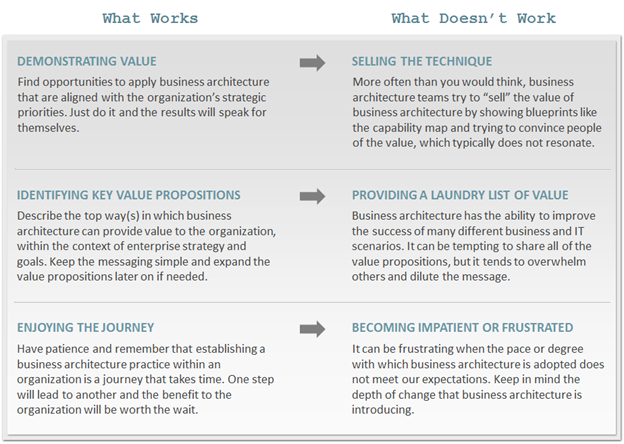Articulating the value of business architecture within our organizations is one of the most important things that we need to do and do well—the results of which can ultimately determine if business architecture is embraced and how it is positioned. However, this can be a real challenge and barrier to growth for many business architecture practices.
The Struggle for Understanding
While the need for and potential value of business architecture can be very obvious to practitioners, it is not always clear to others. This can be extremely frustrating for practitioners, but if we understand the context we can not only interpret peoples’ reactions, but better address the challenge. To effectively communicate the value of business architecture, we need to put ourselves in the minds of our business architecture “customers” and adapt our approach to what they might be thinking.
So what makes business architecture difficult to embrace? Though growing rapidly, business architecture is currently a maturing discipline, making it not readily recognized or accepted as a necessary practice in some organizations. With that as the backdrop, when some people hear about business architecture, they react with skepticism thinking things such as “we’ve been successful without it for decades” or “this is just the flavor of the day; it will pass and I have real work to do.” There may also not be enough quantifiable “pain” for the types of problems that business architecture solves, such as cross-business unit collaboration and common language, making it seem like a lower priority.
Beyond the immediate reactions though, business architecture can be difficult to embrace because it introduces significant change, which can lead to resistance. The very introduction of the discipline can imply that maybe we’ve been doing things wrong, and if we do decide to move forward, then we might have to change, do things we don’t want to do, be more transparent or be more accountable. The types of change that business architecture introduces can go against compensation plans, funding mechanisms and power structures.
Considering all of these factors, the way we communicate about business architecture becomes very important. It should be simple, business results-focused and quantifiable where possible. The messaging should also communicate why business architecture is needed now in particular, which can alleviate some of the concern about not having it in place before.
The Dos and Don’ts of Communicating Business Architecture Value
The comparison below provides guidance on how to approach communicating business architecture value within an organization, based on what typically works and what doesn’t.

Top Three Tips for Establishing the Value of a Business Architecture Practice
Business architecture is essentially a service provided to the organization. Consequently, some of the most successful business architecture teams think like entrepreneurs, as reflected in the tips below.
- Know who you are and communicate it simply.
The first step to establishing a business architecture practice is to define it. This will guide all other steps and decisions in the future.Understand and document the value that business architecture will provide to the organization and show how it aligns with your strategy and goals. You may need to create a “case for change” or quantify the “pain” that business architecture can address if it is not evident. Communicate simply and consistently using business-friendly words and visuals.
- Build a foundation of support.
Like any business, establishing a business architecture practice requires investment in marketing and relationship building, not just the services provided. Many practices underestimate this or are not equipped to do it.
Focus on building support within the organization both top down and bottom up. Of course business executive sponsorship is ideal, so if you have it, leverage it. Whether you do or don’t, continue building relationships with other business and IT executives when you can. Build relationships and formalize integration points with all related functions, processes and disciplines upstream and downstream. Perform marketing and relationship building activities strategically and deliberately, driven by a formal change management approach.
- Take the leap.
In the beginning, opportunities to apply business architecture are often won not given. The business will continue functioning “good enough” until the business architecture leader or team identifies an opportunity to help and asks for the chance to do so.
Execute upon this precious opportunity and then quantify the results and tell the story. Track all success stories, anecdotes and metrics from the beginning and keep telling the story. A business architecture practice is built one win and one advocate at a time, until it becomes integrated into the fabric of the business.
Enjoy the journey.

















